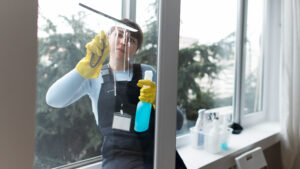As the final days of your lease approach, the daunting task of end-of-lease cleaning looms over every tenant. While this process is crucial for all rentals, furnished properties come with their own set of challenges. In this blog, we will explore the significance of end-of-lease cleaning specifically tailored for furnished accommodations, and why it is essential for a smooth transition between tenants.
The Importance of End-of-Lease Cleaning for Furnished Properties
Preserving Your Deposit
Furnished properties often require a more thorough cleaning compared to unfurnished ones. From sofas and beds to kitchen appliances, every item needs meticulous attention. A comprehensive cleaning regimen not only ensures a tidy space but also safeguards your security deposit. Landlords are more likely to return the deposit promptly if the property is handed back in a pristine condition.

Creating a Positive Impression
When potential tenants inspect a furnished property, they expect cleanliness and hygiene. A well-maintained space not only attracts responsible renters but also sets the right tone for a positive landlord-tenant relationship. A sparkling clean property leaves a lasting impression, increasing the likelihood of a successful lease transition.
Addressing Wear and Tear
Furnished properties often experience more wear and tear due to the constant use of furniture and appliances. End-of-lease cleaning provides an opportunity to address any damages or stains that may have occurred during the lease period. This proactive approach can prevent disputes with landlords and ensure a smooth handover.
Professional Cleaning vs. DIY
While some tenants may opt for a do-it-yourself cleaning approach, hiring professional end-of-lease cleaners for furnished properties can be a game-changer. Professionals have the expertise and tools to clean every nook and cranny, including upholstery and carpets. Investing in professional cleaning services can save time, and effort, and guarantee a superior result.
Checklist for Furnished Properties
Unlike unfurnished spaces, furnished properties demand a more detailed cleaning checklist. This may include deep cleaning upholstery, mattress sanitization, and appliance maintenance. A well-organized checklist ensures that no area is overlooked, leaving the property in top-notch condition.
Environmental Considerations
As awareness of environmental sustainability grows, tenants and landlords alike are emphasizing eco-friendly cleaning practices. Opting for green cleaning products and methods not only benefits the environment but also contributes positively to the property’s overall appeal.

Conclusion
In the world of renting, the importance of end-of-lease cleaning for furnished properties cannot be overstated. From preserving your deposit to creating a positive impression, the benefits are manifold. By approaching this task with diligence and perhaps the assistance of professional cleaners, tenants can bid farewell to their furnished abode with confidence, ensuring a seamless transition for both themselves and the next occupants. After all, a spotless farewell is a testament to responsible tenancy and sets the stage for a harmonious landlord-tenant relationship in the future.
Ready to ensure a spotless farewell and get your full deposit back? Contact us today for a free quote on professional end-of-lease cleaning!
Frequently Asked Questions
How much is an end of lease clean in Melbourne?
The cost of an end-of-lease clean in Melbourne can vary depending on several factors, including the size of the property, its condition, and whether it is furnished or unfurnished. On average, you can expect to pay anywhere from $200 to $600 for a standard end-of-lease clean. However, prices may be higher for larger or more heavily furnished properties.
What is the difference between deep clean and end of tenancy cleaning?
While both deep cleaning and end-of-tenancy cleaning involve thorough cleaning of a property, the key difference lies in their scope. End-of-tenancy cleaning is focused on preparing a property for a new tenant, covering standard cleaning tasks. On the other hand, a deep clean goes beyond the basics, addressing areas not typically included in a regular cleaning routine, such as detailed cleaning of appliances, baseboards, and hard-to-reach spaces.
Is professional cleaning required at the end of tenancy?
While it’s not always a legal requirement, many landlords and property managers recommend or even require professional cleaning at the end of a tenancy. Professional cleaning ensures a thorough job and increases the likelihood of the tenant receiving their full security deposit back.
What’s included in end of tenancy cleaning?
End-of-tenancy cleaning typically includes cleaning and sanitizing all rooms, appliances, and surfaces. This may involve vacuuming and mopping floors, cleaning kitchen appliances, wiping down surfaces, and cleaning bathrooms. The goal is to leave the property in a clean and presentable condition for the next tenant.
What is end of term cleaning?
End-of-term cleaning is another term used interchangeably with end-of-tenancy cleaning. It refers to the thorough cleaning of a rental property at the conclusion of a lease term, preparing it for the next occupants.
Do I need to clean curtains at the end of tenancy?
Whether or not curtains need cleaning at the end of a tenancy depends on the terms of the lease agreement. Some landlords may include curtains in the overall cleaning requirements, while others may not. It’s advisable to check the lease agreement or discuss this with the landlord or property manager.
Do end-of-tenancy cleaners clean walls?
In a standard end-of-tenancy cleaning, cleaners typically focus on cleaning visible surfaces, such as floors, countertops, and appliances. However, if there are noticeable stains or marks on the walls, it’s advisable to address them to ensure the property is returned in good condition.
Do tenants have to clean windows?
Yes, tenants are generally expected to clean windows as part of the end-of-tenancy cleaning process. Clean windows contribute to the overall cleanliness and presentation of the property.
What are the rules for cleaning windows?
The specific rules for cleaning windows may vary, but generally, tenants are expected to clean both the interior and exterior (if accessible) of windows. This includes removing any dirt, smudges, or fingerprints. Some landlords may have specific guidelines outlined in the lease agreement.
What is standard cleaning vs deep cleaning?
Standard cleaning typically includes regular tasks like dusting, vacuuming, mopping, and basic surface cleaning. Deep cleaning, on the other hand, is a more intensive and thorough cleaning process that involves cleaning hard-to-reach areas, detailed cleaning of appliances, and addressing accumulated grime or stains. Deep cleaning is often recommended for end-of-tenancy cleaning to ensure a comprehensive and meticulous job.
